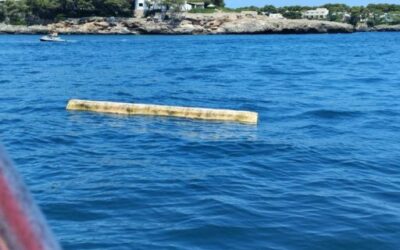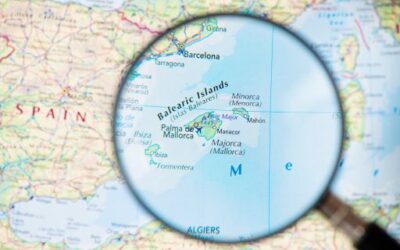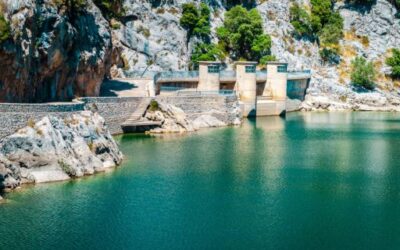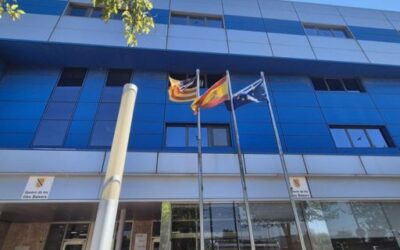A Total of 50 People with Severe Mental Health Diagnoses to Have Access to Shared Housing Arranged by the Government
by Redacción | Aug 20, 2025 | Current affairs, Featured, Interview, Portada, Post, Revista Lloseta, Thursday Daily Bulletin, Tradition
The €4 million service promotes social inclusion and offers a new opportunity for empowerment for those with greater autonomy Councillor Fernández has visited a Fundació Estel apartment in Manacor and spoken with residents, accompanied by Director General María...
Government’s Coastal Cleaning Service Removes 6,479.55 Kilos of Waste in July
by David Arreza | Aug 20, 2025 | Current affairs, Featured, Interview, Portada, Post, Revista Lloseta, Thursday Daily Bulletin, Tradition
Mallorca records the highest volume of collection (3,656.70 kg), followed by Ibiza (1,265.65 kg), Menorca (1,135.60 kg) and Formentera (421.60 kg) During July, the coastal cleaning service managed by Ports de les Illes Balears (PortsIB), an agency under the Ministry...
Consell de Mallorca Approves and Awards the Asphalt Renewal Between Peguera and Port d’Andratx
by Rosa María Cuerda Riutort | Aug 20, 2025 | Current affairs, Featured, Interview, Portada, Post, Revista Lloseta, Thursday Daily Bulletin, Tradition
The works have been awarded for around €6.1 million to the company Matías Arrom Bibiloni SL, and are expected to start next October. The Executive Council of the Consell de Mallorca, presided over by Llorenç Galmés, has definitively approved the project to reinforce...
Ecological Transition Allocates €148 Million to 199 Renewable Energy Projects with Storage
by Redacción | Aug 19, 2025 | Current affairs, Featured, Interview, Portada, Post, Revista Lloseta, Thursday Daily Bulletin, Tradition
The Ministry for Ecological Transition and Demographic Challenge has allocated €148.5 million from the Recovery, Transformation and Resilience Plan to 199 innovative projects combining renewable energy with storage systems. The RENOINN program includes initiatives in...
Agreement Authorised with the British Council Foundation for Educational Activities under the Bilingual Education Program
by David Arreza | Aug 19, 2025 | Current affairs, Featured, Interview, Portada, Post, Revista Lloseta, Thursday Daily Bulletin, Tradition
The program spans from the second cycle of early childhood education to the 4th year of secondary education and promotes integrated teaching of content and the English language Participating schools in the Balearic Islands include CEIP Na Caragol, IES Llorenç Garcias...
Decree Approved to Implement Law 7/2023 on Balearic Communities Abroad
by Rosa María Cuerda Riutort | Aug 19, 2025 | Current affairs, Featured, Interview, Portada, Post, Revista Lloseta, Thursday Daily Bulletin, Tradition
New legal framework updates regulations to ensure integration and visibility of Balearic entities outside the islands The Balearic Government establishes a modern, functional legal framework adapted to current needs The Consell de Govern has approved the Decree...
New Campaign to Raise Awareness and Combat Gender-Based Violence in the Digital Sphere
by Redacción | Aug 19, 2025 | Current affairs, Featured, Interview, Portada, Post, Revista Lloseta, Thursday Daily Bulletin, Tradition
Equality Ministry presents “Digital Violence is Violence,” an initiative to promote awareness and social rejection of online abuse The Ministry of Equality, through the Government Delegation against Gender-Based Violence, has launched the summer campaign “Digital...
Balearic Islands Launch Pioneering Project to Monitor Aquifers in Real Time
by David Arreza | Aug 19, 2025 | Current affairs, Featured, Interview, Portada, Post, Revista Lloseta, Thursday Daily Bulletin, Tradition
A technological challenge led by the Directorate General for Water Resources and IB Digital, in collaboration with UIB, aims to improve groundwater management through advanced sensors The Balearic Islands have launched a pioneering project to monitor the status of the...
Balearic Islands Maintain Full Employment in July with 670,560 Social Security Affiliations, 2.5% More than a Year Ago
by Rosa María Cuerda Riutort | Aug 19, 2025 | Current affairs, Featured, Interview, Portada, Post, Revista Lloseta, Thursday Daily Bulletin, Tradition
The region leads month-on-month growth in affiliations nationwide, with 12,579 new registrations Self-employed workers total 107,375 affiliations, up 2.1% year-on-year Balearic Islands lead Spain in permanent employment contracts, accounting for 68.7% of all contracts...
New Strategy to Boost Green Hydrogen in the Balearic Islands
by Redacción | Aug 18, 2025 | Current affairs, Featured, Interview, Portada, Post, Revista Lloseta, Thursday Daily Bulletin, Tradition
A roadmap to drive renewable hydrogen production and build a solid, efficient hydrogen economy across the archipelago The Balearic Islands have presented a comprehensive roadmap for the deployment of green hydrogen production, a key step in advancing the region’s...
Tourism Hotline Handles Around 1,500 Calls per Month Since Its Launch
by David Arreza | Aug 18, 2025 | Current affairs, Featured, Interview, Portada, Post, Revista Lloseta, Thursday Daily Bulletin, Tradition
The telephone assistance service set up by the Department of Tourism of the Consell de Mallorca several months ago has been handling around 1,500 calls per month since its launch, with an average of about 80 citizen inquiries per day. This initiative aims to improve...
Government to Launch Catalan Language Training for Public Employees in September, Offering Over 1,000 Places
by Rosa María Cuerda Riutort | Aug 18, 2025 | Current affairs, Featured, Interview, Portada, Post, Revista Lloseta, Thursday Daily Bulletin, Tradition
EBAP to Provide Online Courses and In-Person Oral Expression Workshops Across All Islands Catalan language training courses for public employees, organised by the Balearic School of Public Administration (EBAP) — an agency under the Ministry of Labour, Public Service...
Our writters
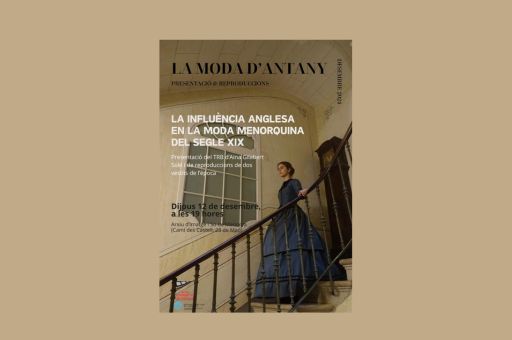
Presentation: The English influence in 19th-century Menorcan fashion
The presentation will take place at the Arxiu d’Imatge i So de Menorca next Thursday 12th December at 7pm in the auditorium of Can Victorii in Maó.
Within the framework of the exhibition ‘LA MODA DE ANTAÑO. Como se vestía en Menorca entre 1850 y 1930’ the Arxiu d’Imatge I So de Menorca proposes a new activity to present the fashion of those years.
TDB keeps you informed. Follow us on Facebook, Twitter and Instagram
Presentation: The English influence in 19th-century Menorcan fashion
Aina Gilabert Solé has done her baccalaureate research work on the English influence on 19th-century Menorcan fashion and has completed it with the creation of two reproductions of dresses from the period. Thus, on Thursday 12th December at 7 p.m. in the auditorium of Can Victori in Maó, she presented the results of this research.
The activity will consist of an explanation of how the historical research was carried out and the results, as well as the presentation of the reproductions of the dresses and the challenges she had to face when sewing them.
The presentation of the work ‘THE ENGLISH INFLUENCE ON 19th CENTURY MENORCAN FASHION’ will take place on 12th December at 7 p.m. in the auditorium of Can Victori in Maó (Camí des Castell, 28). Free access.
Exhibition ‘LA MODA DE ANTAÑO. How people dressed in Menorca between 1850 and 1930’. Auditorium of Can Victori de Maó (Camí des Castell, 28). Visiting hours: Monday to Friday from 9 am to 1.30 pm and on Tuesdays and Thursdays from 4.30 pm to 8 pm.
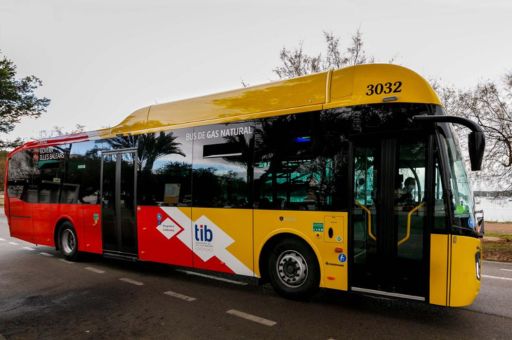
The number of passengers travelling on TIB buses rises by 42% in the first four months of 2024
Nearly 6.5 million passengers travelled on TIB between January and April, an increase of 1.9 million (42%) compared to the same period last year.
The Ministry of Housing, Territory and Mobility of the Government of the Balearic Islands, through the Transport Consortium of Mallorca (CTM), has recorded in the first four months of the year, from January to April 2024, nearly 6.5 million passengers who have travelled on the TIB bus, which represents an increase of 42.2% in the number of users compared to the same period of 2023, when free travel on all public transport was already in force.
TDB keeps you informed. Follow us on Facebook, Twitter and Instagram
The number of passengers travelling on TIB buses rises by 42%
During the first four months of this year, the increase was more than 1.9 million passengers compared to the same period in 2023, from 4.5 million to nearly 6.5 million. This 42% increase in demand for TIB network buses comes between two periods in which free transport had already been introduced for users travelling with the Intermodal Card.
At present, the interurban public transport of the TIB network connects the different municipalities and areas of Mallorca with 71 bus lines. To cope with the increase in demand, both during the winter season and in the new service for the summer season, reinforcement measures have been adopted, mainly to increase frequencies on the bus lines.
During the winter season, from 1 November to 21 March, the TIB network was reinforced with an increase of 27 bus lines compared to the previous winter, an improvement of 53% of the total number of lines operating in this period. Likewise, for the summer season, this year the start of the reinforcement of the service was brought forward to 22 March compared to the last high season.
For the summer season, frequencies have been increased on a total of 24 bus lines, resuming service on sixteen lines and incorporating a new line (131) in the Serra de Tramuntana, between Santa Ponça, Banyalbufar and La Granja de Esporles.
Ten new compressed natural gas buses are expected to be added to the TIB’s current sustainable fleet in the coming weeks, increasing the current fleet, which currently has 201 compressed natural gas buses and eighteen electric buses.
About the reinforcements adopted for the summer season, in the Ponent area, the nuclei of Palmanova and Magaluf (104) have been better connected with services every 15 minutes in each direction, and, compared to last summer, the improved offer in the tourist area of Costa de la Calma also stands out, which almost doubles connectivity with Palma and Santa Ponça, with a new frequency of 25 minutes.
In the northern area of Mallorca, the late-night service on the suburban line connecting Alcúdia-Can Picafort (324) has been reinforced, reaching beyond 00.00 h with a stable frequency of 12-13 minutes; line 302 has been improved compared to 2023 by increasing the frequency to one bus every twenty minutes during peak hours and extending the service until 0. 10 am to ensure that hotel and restaurant workers can return home; and in the centre of Cala Sant Vicenç, line 321 has brought forward the daily start time to 7.10 am.
On the Llevant coast, the Cales de Mallorca line (416) has increased its services by 50% since the end of March, and in the Migjorn area, the Campos-Palma express services (501) have been added throughout the day. Concerning the Aerotib lines that connect with Palma airport, the A32 and A42 lines have increased their service by 10 % compared to the summer of 2023.

SFM reinforces safety in transport and promotes the use of the train through actions with various collectives
The railway company signs an agreement with the Guardia Civil for the delivery of 300 transport cards and will extend this initiative to other entities
Serveis Ferroviaris de Mallorca (SFM) has signed a collaboration agreement with the 17th Zone/Commandery of the Civil Guard of the Balearic Islands to allow free travel to all its members in the services managed by the railway administrator. For this purpose, 300 non-nominative transport cards have been delivered to them, which can be used by all the members of this corps belonging to the demarcation of the island of Mallorca.
TDB keeps you informed. Follow us on Facebook, Twitter and Instagram
SFM
The cards provided through this initiative have an identification number that will allow to have a personalized record of its use by the Command and the main objective is that the members of the corps can have easy access to both train and metro stations to facilitate possible interventions or develop research and intelligence work, but also encourage the use of public rail transport among its members.
The measure gives continuity to other similar agreements already in effect by SFM, such as the one made under the same conditions with the National Police a few years ago or with the Local Police of Sineu, more recently. Likewise, SFM intends to follow the same steps with other local police forces in municipalities along the railway corridor.
On the other hand, SFM has opened the application for obtaining group tickets to new entities, such as associations or leisure and free time entities, the different groups of the Moviment Escolta i Guiatge de Mallorca, entities that work with people with functional diversity or senior citizens or other similar groups that want to benefit from the advantages of this ticket.
Until now, the purchase of group tickets was authorized exclusively to schools attached to the Ministry of Education of the Government of the Balearic Islands, being free of charge for students in kindergarten, primary and secondary schools and offering very low fares for the rest of the courses.
It should be remembered that the group ticket must be requested to SFM in advance and following the established channels and it is not necessary to have the Intermodal Card to make use of it by any member of the group traveling on the train. It is a type of ticket widely used for excursions or outings by schools since, apart from the economic benefit if you do not have an Intermodal Card, it allows you to organize the trip with the advice of the railway company’s staff and speeds up the access and exit of the stations for the comfort and safety of both the group making the trip and the rest of the users of the railway network.
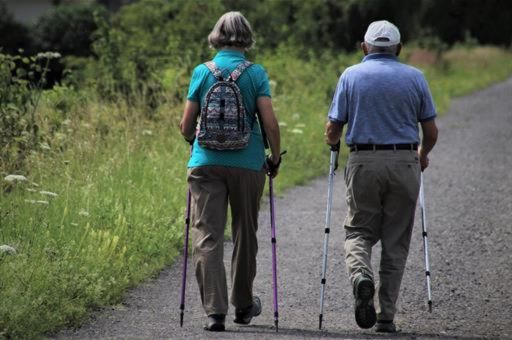
The Government revises upwards the “pension fund”, which will close the year with 9,300 million
The Social Security Reserve Fund exceeded 8.3 billion euros in September and will end 2024 with 300 million more than expected.
The Social Security Reserve Fund reached €8.356 billion on September 30, the highest level since December 2017, and is set to end the year with nearly €9.3 billion accumulated.
TDB keeps you informed. Follow us on Facebook, Twitter and Instagram
The Government revises upwards the “pension fund”, which will close the year with 9,300 million
The so-called ‘pension piggy bank’, which ended 2023 with 5,578 million euros, has so far this year received contributions worth 2,623 million euros, thanks to the Intergenerational Equity Mechanism, which came into force in 2023, to provide resources to this fund through a percentage of the contribution for common contingencies, distributed between the company and the worker with the same distribution as in social contributions.
In September alone, the Reserve Fund received allocations of 314.7 million euros, to which will be added those corresponding to the last three months of the year.
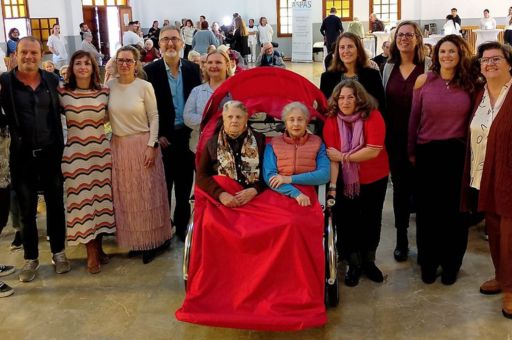
La Llar d’Ancians launches the project ‘En bici sin edad’ to combat loneliness and reconnect with the community
This volunteer project of the Mallorca Integra Foundation offers rides to elderly people living in the centre managed by IMAS.
Combating unwanted loneliness, promoting intergenerational relationships and reconnecting the elderly with their surroundings and the community are the objectives of the project ‘En bici sin edad’ (‘By bike without age’). A volunteer action implemented with great success in other Spanish and European cities which, for the first time, comes to the Balearic Islands, thanks to the Mallorca Integra Foundation, in collaboration with MBW Proa Premium and the ‘la Caixa’ Foundation.
TDB keeps you informed. Follow us on Facebook, Twitter and Instagram
La Llar d’Ancians launches the project ‘En bici sin edad’ to combat loneliness and reconnect with the community
Users with reduced mobility or who do not have a family at the Llar d’Ancians residence, which IMAS manages in Palma, will be the first in the autonomous community to be able to enjoy this innovative yet simple experience, which offers outings on electric tricycles with capacity for up to two people, to go for rides around Palma, visit their old neighbourhood, see the Christmas lights or the sea, accompanied by a volunteer who drives the vehicle.
‘This is a project that contributes to promoting active, healthy and integrated ageing within the community, which is what IMAS is committed to’, stressed the Vice-President of the island’s institution, Magdalena García Gual, who thanked the work of Mallorca Integra, MBW Proa Premium, the “la Caixa” Foundation and the volunteers who make it possible. ‘Volunteering contributes to the common good, the work you do complements that of the professionals and allows the elderly to enjoy activities like this, which strengthen their self-esteem, sense of belonging and social integration’, she said.
The Vice-President of IMAS closed the presentation ceremony of ‘En bici sin edad’, which was also attended by the Councillor for Families and Social Affairs of the GOIB, Catalina Cirer, the Director of Social and Health Care of the Consell de Mallorca, Rosa Llobera, the Councillor for the Elderly and Interculturalism of Palma City Council, María Luisa Marqués, as well as representatives of the sponsoring organisations and the directors of the Mallorca Integra Foundation, Catalina Miralles and Aurora Sampol, who will coordinate and direct this project.

“Language goes to the Museum” offers a new opportunity to share Catalan as part of the celebration of International Museum Day
The activities will take place in Ibiza, Menorca and Mallorca.
The Institute of Balearic Studies (IEB) is launching a new initiative to promote the use of the Catalan language through guided tours to discover the environment, history and culture of our islands. The initiative aims to create spaces for socialising in which Catalan speakers and people who want to practice the Catalan language can participate.
TDB keeps you informed. Follow us on Facebook, Twitter and Instagram
New opportunity to share Catalan as part of the celebration of International Museum Day
The initial activities have been carried out on the island of Mallorca, aimed exclusively at students on IEB courses. The first visit took place this Monday, 13th May, at 6A Taller i Galeria d’Art, where they were able to see the gallery’s current exhibition and the printmaking workshop. The second meeting is scheduled for today, Wednesday the 15th of May, with a morning and afternoon session at Es Baluart Museu d’Art Contemporani de Palma. During the visit, visitors will be able to tour the exhibitions by Belio Fullana and Ana Laura Aláez, as well as see the terraces of the emblematic building.
The following visits will take place in Ibiza and Menorca on Saturday the 18th of May, coinciding with International Museum Day. In the city of Ibiza, there will be a guided tour of the Puig des Molins Monographic Museum, through some specially selected objects to learn about the universe of beliefs, rites and funerary behaviour of the men and women of antiquity. You will also have the opportunity to walk through the necropolis and descend into a set of 2,500-year-old underground tombs.
In Menorca, the Museum of Menorca in Maó has prepared a guided tour of its permanent exhibition, with ten carefully chosen objects that invite visitors to travel through the history of Menorca and learn about the island’s details from the technicians.
The director of the Institute of Balearic Studies, Llorenç Perelló, states that “initiatives like this promote the regular use of the Catalan language in different scenarios of everyday life, such as these guided tours, to learn about the culture of our islands at the same time”.

Youth and Children presents an institutional campaign to make violence against children visible
The Ministry of Youth and Children has presented the institutional campaign Signs that could mean a lot, with the aim of raising awareness against violence against children and adolescents.
Institutional campaign to make violence against children visible: ‘Signs that could mean a lot’.
The campaign encourages people to pay attention to the signs that can give away these types of situations, which are often invisible or even normalised.
TDB keeps you informed. Follow us on Facebook, Twitter and Instagram
Youth and Children presents an institutional campaign to make violence against children visible
Violence against children and adolescents is often minimised or relegated to the private sphere. They have a strong impact on the physical, emotional and social development of children and adolescents, and can limit the life projects of those who suffer them.
The Minister for Youth and Children, Sira Rego, said: ‘The silence surrounding the violence suffered by a child or adolescent speaks of society as a whole, of our lack of care and respect for children’s rights. To break this invisibility and combat it requires a commitment at all levels, from institutions to those who work or spend time with children, including families.
Children and young people who experience violence often find it difficult to put words to what is happening to them, especially younger people. The campaign encourages paying attention to signs that may indicate that someone is suffering from violence, such as sudden changes in behaviour, uncontrolled fears, somatisation, mutism, avoidance of people or places they used to like, fear of undressing, self-harm or violent play.
‘Just as society has realised that male violence against women is unacceptable and that it must be expelled from all public and private spheres, we must act forcefully to eradicate violence against children and adolescents’, added the minister.
Rego presented the campaign together with the Director General for the Rights of Children and Adolescents, Sandra de Garmendia, who stressed that regardless of whether it is physical or psychological violence and who perpetrates it against them, violence against children and adolescents is ‘unacceptable’.
‘They violate their fundamental rights, recognised in article 39 of the Spanish Constitution and in various international treaties such as the United Nations Convention on the Rights of the Child,’ the director general stressed.
Signs that could say a lot follows in the wake of two previous institutional campaigns, promoted by the Directorate General for Children and Adolescents. The campaigns are part of the efforts to eradicate violence against children promoted by the Organic Law for the Comprehensive Protection of Children and Adolescents against Violence ( LOPIVI).
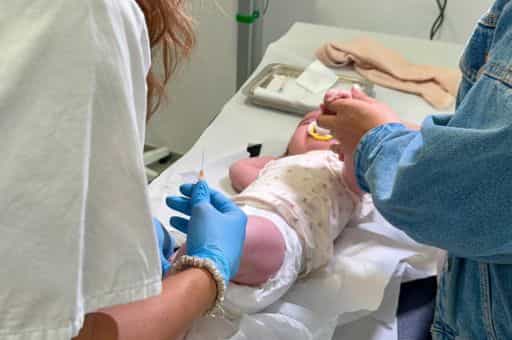
Health reinforces child vaccination against pneumococcus with a more complete vaccine
From this April, the Balearic Islands will improve the children’s vaccination schedule with the inclusion of the 20-valent pneumococcal conjugate vaccine. Until now, and since 2016, babies have been immunised against 13 serotypes in three doses. From this April, and following the authorisation of the European Medicines Agency for the use of the 20-valent pneumococcal conjugate pneumococcal vaccine, the Balearic Islands will be the first Autonomous Community to include this booster vaccine in the children’s vaccination schedule.
TDB keeps you informed. Follow us on Facebook, Twitter and Instagram
Health reinforces child vaccination against pneumococcus
The Director General of Public Health, Elena Esteban, explained this morning, in a presentation at the Palmanova health centre, all the details of the vaccine recently incorporated into the children’s vaccination schedule, which can achieve up to four times more protection than the previous vaccine of 13 serotypes, taking into account the circulating serotypes.
As explained by Elena Esteban, who was accompanied by the coordinator of the Primary Care vaccination centre, Verónica Vega, the immunisation of babies with the new drug will be carried out in four doses: at 2, 4 and 6 months, with a booster at 11 months.
This booster vaccine with 20 serotypes has been included in the adult population’s schedule as a single dose since last October. Vaccination against pneumococcal disease in adults is indicated for people aged between 65 and 75 years and people with risk factors for invasive pneumococcal disease: transplant recipients, cancer patients, immunocompromised people, people with immunodeficiencies, cardiovascular or respiratory diseases or people institutionalised in nursing homes.
The Directorate General of Public Health of the Regional Ministry of Health has purchased 40,000 doses for the period between 31 March 2024 and 30 March 2025, with an investment of 1,961,000 euros. Of these, 25,500 doses are expected to be administered to the paediatric population, which usually achieves a vaccination coverage of 90%.
Pneumococcal pneumonia and invasive pneumococcal disease (IPD) are a major health problem, mainly associated with the existence of risk factors and also related to age. In Spain, in recent years, the National Epidemiological Surveillance Network (RENAVE) has recorded between 3,000 and 4,000 cases per year, mainly affecting children under five years of age and older people.
Vaccination is an essential tool to prevent invasive pneumococcal disease, and for this reason, the vaccine was included in the children’s schedule in 2016. In the case of older people, the vaccine was already administered to people in at-risk groups and 2018 the Public Health Commission approved universal vaccination at 65 years of age.
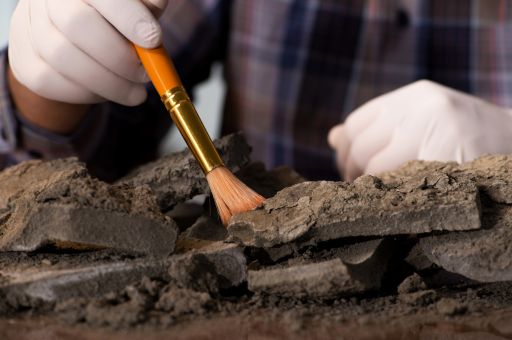
The Consell de Mallorca subsidises a total of 10 archaeological research projects over three years with almost 700,000 euros
The initiative includes projects by universities, town councils and private individuals that will promote studies on the chronology and practices of the past.
The Consell de Mallorca is subsidising a total of 10 archaeological research projects over three years with a total of 692,415 euros. The aim is to promote scientific archaeological research on the island and contribute to the conservation and maintenance of the island’s historical heritage.
The vice-president of the Consell de Mallorca and councillor of Culture and Heritage, Antònia Roca, explained that the selected projects contemplate different lines of research, including the analysis of ancient structures, studies of chronology and functionality, and studies on past fauna and flora. The subsidy will be distributed as follows: 140,641 euros in 2024, 276,889 euros in 2025 and 274,885 euros in 2026.
TDB keeps you informed. Follow us on Facebook, Twitter and Instagram
The Consell de Mallorca subsidises a total of 10 archaeological research projects over three years with almost 700,000 euros
The grant programme includes projects promoted by universities, research centres, town councils and other entities. ‘This diversity reflects the richness and transversality of archaeology as a fundamental discipline for society,’ says Roca. He also stresses that ‘with this initiative, we reaffirm our commitment to the preservation of Mallorca’s cultural heritage and support researchers who contribute to the understanding of the island’s history and identity’.
It is important to note that in 2024 the Consell de Mallorca has allocated a total of 565,000 euros to seven municipalities on the island to acquire archaeological sites: Manacor, Alcúdia, Petra, Selva, Santa Margalida, Llubí and Sencelles will thus be able to incorporate spaces of great historical and cultural value into their public heritage.
Visit to the Es Turassot archaeological site
The Vice President of the Consell de Mallorca and Councillor of Culture and Heritage, Antònia Roca, visited the Es Turassot site in Costitx, along with the Mayor of Costitx, Antoni Salas, one of the subsidised projects that received the highest scores for its quality, suitability and technical, temporal and economic viability.
In this navetas settlement, the council will carry out excavations to analyse the domestic and economic practices of the period, as well as the chronology and functionality of its structures. Roca stresses that ‘this project will provide a better understanding of the spatial organisation, economic activities and cultural changes in the settlements of the Pla de Mallorca, which will contribute to scientific knowledge and the dissemination of the island’s archaeological heritage’.
Salas stresses that ‘the navetas settlement of Es Turassot is a unique opportunity to enhance the historical heritage of Costitx, as it is an exceptional testimony to understanding how the communities of the Pla de Mallorca lived and interacted millennia ago’.
Beneficiaries
The beneficiaries of these 10 projects are universities and research centres, local councils and individuals. Specifically, the beneficiary universities and research centres are the UIB, which will carry out two studies: one on the Indigenous communities of Mallorca during the Iron Age and another on the Closos de Can Gaià and its surroundings; the IMEDEA, which will study the chronology and functionality of Mallorcan sanctuaries; the Instituto de Ciencias del Patrimonio-CSIC, which will carry out an interdisciplinary research project on the exploitation and use of copper in the prehistory of Mallorca; the Institut Català de Paleontologia Miquel Crusafont (ICP), which will study the island’s early ecosystems; and finally, the University of Valencia, which will re-excavate the Sec shipwreck to understand commercial and technological aspects.
As for local councils, the beneficiaries are Costitx Town Council, which will carry out the excavation and study of the set of navetas of Es Turassot, from the Talayotic period, to analyse domestic and economic practices; Montuïri Town Council, which will investigate the transformations of the Son Fornés settlement after the Talayotic period; and Santanyí Town Council, which will carry out a study on fortifications and social changes in Mallorcan settlements in the Second Iron Age.
Finally, as far as private individuals are concerned, there is only one beneficiary: the Sóller Botanical Garden Foundation – Balearic Museum of Natural Sciences, which will carry out a study on fauna and flora linked to extreme climatic periods in the Mediterranean.
307 million euros in European aid awarded to 381 local authorities to renovate public buildings
The Ministry of Transport, Mobility and Urban Agenda (Mitma) has provisionally awarded these ‘Pirep local’ grants, which will directly benefit some 16 million citizens.
The Ministry of Transport, Mobility and Urban Agenda (Mitma) has provisionally granted 307 million euros of European recovery funds to 381 local authorities in all provinces for the rehabilitation of public buildings owned by them.
TDB keeps you informed. Follow us on Facebook, Twitter and Instagram.
The Mitma’s electronic headquarters has published this provisional resolution of the call in competitive concurrence of Line 1 of the Programme to Promote the Rehabilitation of Public Buildings (Pirep local) included in the Recovery, Transformation and Resilience Plan (PRTR).
In total, Mitma has selected 405 actions out of the 1,065 presented by the potential beneficiaries of the programme: municipalities, provincial councils, councils and island councils. At this point, it is worth remembering that municipalities with more than 50,000 inhabitants and provincial capitals could submit two applications, so there are 24 municipalities that have obtained funding for two rehabilitation projects.
Even so, the municipalities with less than 50,000 inhabitants are of particular relevance in the provisional resolution, with 321 projects awarded, which are entitled to aid of some 186 million euros, with an average subsidy per application of 579,531 euros. Of these 321 projects, 172 are in municipalities with less than 5,000 inhabitants, the so-called demographic challenge municipalities.
After the publication of the list, the selected local entities will have a period of 10 days to expressly accept the grants, before the final resolution is published.
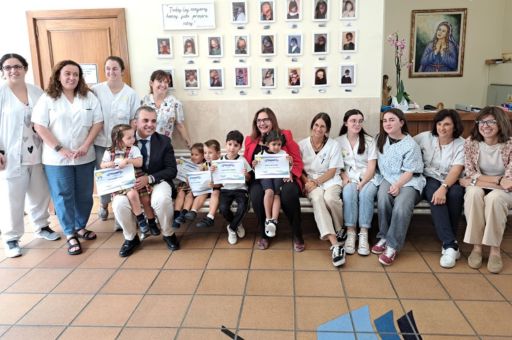
The Pilot Plan for Childhood Immunisation against the flu has now been completed in 16 schools
The councillor for Health, Manuela García, and the councillor for Education, Antoni Vera, attended the vaccination of 237 children at the Santa Mónica school in Palma, 65% of those vaccinated.
The pilot school immunisation plan continues, with 2,900 students born between 2019 and 2021 to be vaccinated.
The councillor for Health, Manuela García, accompanied by the councillor for Education, Antoni Vera, went today to the Santa Mónica school in Palma to show her support for the flu vaccination of 237 children in the second cycle of infant education, 65% of the 365 children enrolled in the school at these educational levels.
TDB keeps you informed. Follow us on Facebook, Twitter and Instagram
The Pilot Plan for Childhood Immunisation against the flu has now been completed in 16 schools
The heads of Health and Education were accompanied during their visit to the Santa Mónica school by the director of Primary Care Nursing, Victòria Pascual, and Toñi Tarongí, pedagogical director of Infant and Primary Education, among other authorities.
Manuela García welcomed the high percentage of pupils whose parents gave their permission for them to be vaccinated and thanked them for their responsible attitude, reminding them that vaccination is recommended for this group of healthy children because the flu does not cause the most common symptoms of the epidemic disease, such as fever and fatigue, among them. ‘Young children who contract the flu can have serious complications such as pneumonia, asthma attacks or otitis,’ he said.
Vaccination is also recommended for this group even though the lethality rate among children under 15 years of age is very low. Ninety-five per cent of children who die from the disease are under five years of age.
Moreover, this age group has the second highest rate of hospitalisation and ICU admission due to influenza after the elderly. Not to mention the role that these children play in transmitting the flu in their homes and with their close relatives, sometimes elderly and fragile people in whom contagion can have tragic consequences.
These children under five years of age have been immunised as part of the pilot child vaccination plan, which was launched in coordination with the Ministries of Health and Education on Monday 14 October and will continue until 14 November. In this pilot scheme, 2,900 schoolchildren born between 2019 and 2021 from 24 public and state schools on the islands, as well as one private school, will be able to be immunised in their school. Eleven schools in Mallorca, eight in Ibiza and Formentera and five in Menorca are participating in this plan. This pilot plan has already been completed in 16 schools.
The acceptance rates for this vaccination at school have been as follows, by island: in Mallorca, 52%; 40% in Menorca; 32.3% in Ibiza and 50% in Formentera.
The children participating in this pilot plan are immunised in complete safety. Nurses from the health centres closest to the schools come to the classrooms with a first-aid kit to treat any possible adverse effects of the vaccines and remain there for up to half an hour after the last child has been immunised to prevent them from occurring. Children with severe egg allergies or intolerances or those with significant immunodeficiency will be excluded from this school vaccination.
Children aged 2 years to 4 years and 11 months have been given a convenient and painless intranasal flu vaccine. For the youngest children, from six months to two years of age, an inactivated injectable vaccine will be administered.

Ecological Transition grants 21 million euros in aid for digital skills in rural areas
The Minister for Ecological Transition and the Demographic Challenge, Sara Aegesen, has announced in the Senate the publication of the resolution to finance the projects of 40 local entities and non-profit associations that will train 110,000 people in rural areas.
The Vice-President and Minister for Ecological Transition and the Demographic Challenge, Sara Aagesen, has announced that the ministry she heads has published the final resolution of the line of aid for the Digital Rural Challenge Programme.
‘On this occasion, 40 local entities and non-profit associations have benefited, and in this case, these 21 million that come from the Recovery, Transformation and Resilience Plan, will allow approximately 110,000 students to have new skills in the digital environment,’ said the Vice President before the Senate’s Commission on Depopulation and Demographic Challenge.
TDB keeps you informed. Follow us on: Facebook, Twitter and Instagram
Ecological Transition grants 21 million euros in aid for digital skills in rural areas
The Rural Digital Challenge Programme seeks to promote the development of digital training initiatives for the inhabitants of rural areas, with a special focus on the most vulnerable groups in rural areas: the elderly, the unemployed and children and young people.
The aim is to promote the acquisition of basic digital skills by citizens, so that they can operate with confidence and security when communicating, getting information, carrying out formalities or solving problems in the digital environment. A programme that complements the progress made in terms of the digital divide between cities and towns, which has been reduced by 36 points since 2018.
‘The digital divide with cities has gone from 42 points in 2018 to 6 in 2024. This is a success story for the country, a necessary condition for creating opportunities in rural areas. And, with the Conéctate35 satellite coverage programme, promoted by Hispasat, rural broadband coverage is 100%. At last, rural areas have universal coverage. In just a few years this government has taken the figures from 38% to 100%’, Aagesen highlighted.
The beneficiaries of the final resolution announced by the Vice-President include 10 local entities – provincial councils – and 30 non-profit associations that will provide training in basic digital skills in rural environments and demographic priority areas and, specifically, in municipalities with a population of 5,000 inhabitants or less, or municipalities with more than 5,000 inhabitants, when the actions are carried out in smaller local entities and municipalities with more than 20,000 inhabitants with scattered population centres, as long as the actions are carried out in these centres.
The Provincial Council of Badajoz, the Fundación Universidad Empresa de la Región de Murcia, the Provincial Council of Ourense, the Provincial Council of A Coruña and the Unión de Pequeños Agricultores are some of the entities that receive the largest funding to deploy their projects, with grants of up to 750,000 euros.
The training will be provided before the second quarter of 2026, paying special attention to young people, women, the unemployed and the elderly. Thus, through the implementation of this programme, the Ministry for Ecological Transition and the Demographic Challenge expects to train a total of 110,000 students, which represents an increase of 22% over the targets set in the Recovery Plan, which includes a commitment to train 90,000 people.

The Consell de Mallorca opens the doors of its most emblematic buildings during Open House Palma
The island institution will be showing the Palau del Consell, the Llar de la Infància, the Teatro Principal and the Museum of Mallorca this weekend
The Consell de Mallorca has once again joined the Open House Palma initiative and will open the doors of four of its buildings. This Saturday and Sunday citizens will be able to visit the most emblematic buildings of the island’s institution free of charge and with a guided tour. The novelty this year is that, for the first time, it will be possible to visit the Llar de la Infància.
TDB keeps you informed. Follow us on Facebook, Twitter and Instagram
The Consell de Mallorca opens the doors of its most emblematic buildings during Open House Palma
This is the fourth edition of Open House Palma, whose motto this year is ‘La ciutat per a qui l’habita’ (The city for those who live in it). In addition to the Llar de la Infància, the island institution will be opening the Palau del Consell, the Teatro Principal de Palma and the Museum of Mallorca. There is no need to register in advance for the visits; it is a free-access space. Once there, the volunteers will indicate the approximate waiting time for the visit.
The Palau del Consell de Mallorca and the Llar de la Infància will be open on Sundays from 10 am to 2 pm and from 4 pm to 7 pm. Palma’s Teatro Principal can be visited on Saturday from 10 am to 2 pm, and the Museum of Mallorca will also be open on Saturday from 4 pm to 7 pm.
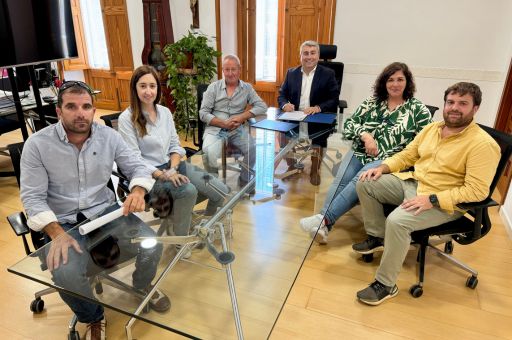
Inca Town Council and the Pagesa de Inca Cooperative signed a collaboration agreement for the modernisation of their facilities
The Inca Town Council reaffirms its commitment to the farming sector and local farmers with the approval of a direct subsidy to the Pagesa de Inca Cooperative. In this way, the town council of the capital of Raiguer has granted a subsidy of 40,000 euros to improve the development of its work and contribute to increasing efficiency and sustainability.
TDB keeps you informed. Follow us on Facebook, Twitter and Instagram
Inca Town Council and the Pagesa de Inca Cooperative signed a collaboration agreement
“This agreement is another example of the commitment of the Inca Town Council to the local agricultural sector. The Pagesa de Inca Cooperative plays a crucial role in our community and this modernisation of their facilities will allow them to continue their valuable work more efficiently,” says the Mayor of Inca, Virgilio Moreno.
The main objective of this direct subsidy is to provide economic support to the farmers of Inca, in order to promote the maintenance and growth of the sector. This aid will provide the Cooperativa Pagesa de Inca with the resources necessary to equip and modernise the shop, warehouse, offices and meeting room at the headquarters of the Cooperativa Pagesa de Inca.
“The main objective of this grant is to strengthen the sector and ensure its sustainable development. In this way, we support the Cooperativa Pagesa de Inca, a reference entity in the town, in its work of advising and training local farmers, as well as promoting agriculture and the development of the primary sector in Inca”, explains the councillor for the Environment, Helena Cayetano.
The signing of the grant agreement for the modernisation and adaptation of the cooperative’s headquarters was presided over by the mayor of Inca, Virgilio Moreno, and the president of the Pagesa de Inca Cooperative, Tomeu Martorell. Also present at the meeting were the councillor for the Environment, Helena Cayetano, and other representatives of the cooperative.
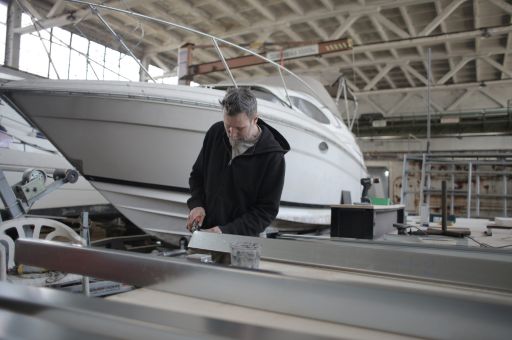
The Regional Ministry of Education implements the intermediate level of VET in Boat Maintenance at CIFP Can Marines from September
This new cycle responds to the demands of the need to incorporate studies linked to the nautical sector.
Students will do their paid internships at the facilities of members of the Association of Industries and Nautical Services of Ibiza and Formentera
The Department of Education and Universities incorporates the middle grade of Vocational Training in Maintenance of Recreational Boats in the intensive dual mode in the Integrated Vocational Training Centre (CIFP) Can Marines of Santa Eulària des Riu, on the island of Ibiza, which will begin to be taught next September. Fifteen places will be offered for this degree.
TDB keeps you informed. Follow us on Facebook, Twitter and Instagram
The intermediate level of VET in Boat Maintenance at CIFP Can Marines from September
The Regional Minister of Education and Universities, Antoni Vera, accompanied by the Director General of Vocational Training and Educational Planning, Maria Isabel Salas; the territorial director of Education in Ibiza and Formentera, Juan Álvarez, the president of the Association of Nautical Industries and Services of Ibiza and Formentera, Ramon van der Hooft, and the director of CIFP Can Marines, Pep Marí Tur, today presented the new studies, which will be taught for the first time in Ibiza and which will respond to the needs and demands of the nautical sector of the Pitiusas.
Students enrolled in the new intermediate degree will do their internships at the facilities of members of the Association of Nautical Industries and Services of Ibiza and Formentera. The studies will be taught in dual intensive regime, which means that students will have an employment contract and remuneration during their training.
The incorporation of these studies responds to the claims of companies in the sector, which warn of the lack of skilled labour. Professionals with this profile are in great demand in Ibiza, and in response to this need, the Regional Ministry of Education and Universities has decided to incorporate this educational offer, which has a high labour market insertion rate.
These studies are already offered in Mallorca and Menorca, and now they are also being incorporated into the CIFP Can Marines, where the intermediate degree in Navigation and Coastal Fishing Technician and the advanced degree in Maritime Transport and Deep-sea Fishing are already being offered.

7.6 million is allocated to the entity Servicios de Teleasistencia SA for the agreement from 2024 to 2026
The entity will manage 13,000 terminals between basic and advanced TAD in 2024, 14,800 in 2025 and 15,900 in 2026.
The budget distribution is 483,760 euros in 2024, 3,610,630 in 2025 and 3,587,677 in 2026.
The Consell de Govern has authorised the councillor for Families and Social Affairs to allocate a maximum expenditure of 7,682,067 € for the agreement with the entity Servicios de Teleasistencia SA for the home telecare service for people in a situation of dependency from October 2024 to September 2026.
TDB keeps you informed. Follow us on Facebook, Twitter and Instagram
7.6 million is allocated to the entity Servicios de Teleasistencia SA for the agreement from 2024 to 2026
The distribution of the budget is as follows:
483,760 € in October and November 2024 concerning the number of terminals previously contracted (7,200 basic TAD and 4,800 advanced TAD. The newly contracted terminals (800 basic TAD and 200 advanced TAD) will be with the effects of the agreement.
3,610,630 from December 2024 to November 2025.
3,587,677 from December 2025 to September 2026.
Currently, of the 12,000 terminals contracted by Servicios de Teleasistencia SA, 7,200 terminals are basic TAD and 4,800 are advanced TAD. The request that the entity has formalised is to manage: 8,000 basic TAD terminals and 5,000 advanced TAD terminals in 2024, 8,600 basic TAD terminals and 6,200 advanced TAD terminals in 2025, and 8,500 basic TAD terminals and 7,400 advanced TAD terminals in 2026.
The reference price per terminal/month is 14.96 € (VAT included) for basic TAD and 24.44 € for advanced TAD in 2024, 16.65 € (VAT included) for basic TAD and 26.30 € for advanced TAD in 2025 and 18.37 € (VAT included) for basic TAD and 28.17 € for advanced TAD in 2026.
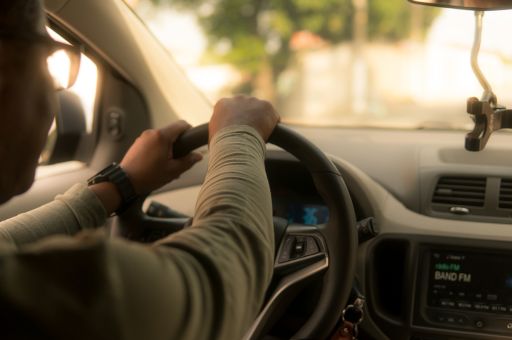
The Consell de Mallorca meets with car hire companies to study solutions to the saturation of roads
The Minister of Territory, Mobility and Infrastructures, Fernando Rubio, today received representatives of AEVAB and BALEVAL to gather their contributions to the study of the road network load that the island institution is preparing.
TDB keeps you informed. Follow us on Facebook, Twitter and Instagram
The Consell de Mallorca meets with car hire companies
The Minister of Territory, Mobility and Infrastructures, Fernando Rubio, met today with representatives of the two car hire associations of the Balearic Islands to study measures agreed with the sector to study solutions to the saturation of Mallorca’s roads. Rubio was accompanied by the island directors of Mobility, Rafael Oliver, and Infrastructures, Rafel Gelabert. The delegation from the Agrupación Empresarial de Alquiler de Vehículos con y sin Conductor de Baleares (AEVAB) was headed by its president Ramon Reus. For its part, the Balearic Association of Car Rental with and without Driver (BALEVAL) was represented by its board of directors, chaired by Othman Ktiri.
Fernando Rubio explained that the Department of Territory, Mobility and Infrastructures is working intensively to draw up a study of the load on the island’s roads, a document that until now has never been carried out in Mallorca to find out with official and contrasted data what the causes of the traffic jams on Mallorca’s road network are. Rubio reiterated that the study will also propose solutions, both with infrastructures and possible regulations, and that the Consell is ‘willing to take courageous measures’ to improve the mobility of Mallorcans, as the president of the Consell de Mallorca, Llorenç Galmés, has stated on several occasions.
The car hire companies have shown their willingness to collaborate with the Consell in the search for effective solutions to alleviate the saturation of the island’s roads.
Today’s meetings with AEVAB and BALEBAL are the second that the Department of Territory, Mobility and Infrastructures will hold with representatives of the sectors involved and civil society. The aim is to hear their opinions first-hand and reach a consensus on possible solutions to the saturation suffered by Mallorca.
Ramón Planes Socies
ESCAC student in Terrassa will teach us how to tell stories from any of the disciplines taught at ESCAC: directing, art direction, documentary, screenwriting, editing, production, sound design or visual effects production.
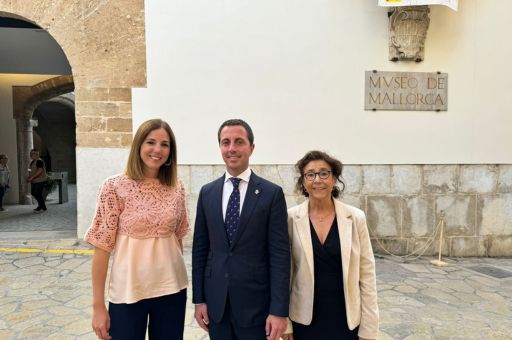
The Consell de Mallorca organises an exhibition dedicated to Sorolla: for the first time, the 12 works he produced on the island will be shown together
The exhibition will be on display at the Museum of Mallorca from 3 June to 8 September.
The Consell de Mallorca is organising an exhibition dedicated to Joaquín Sorolla. The president of the Consell de Mallorca, Llorenç Galmés, has announced that “for the first time, the 12 works that the artist produced on the island will be shown together in the same room”.
TDB keeps you informed. Follow us on Facebook, Twitter and Instagram
The Consell de Mallorca organises an exhibition dedicated to Sorolla
The exhibition will be inaugurated on 3 June at 7 p.m. at the Museum of Mallorca and will be open until 8 September. During these months, stressed the president of the Consell de Mallorca, Llorenç Galmés, “it will be possible to enjoy the essence of Sorolla: his textures, brushstrokes and experimentation with colours and light that he carried out in places like Palma, the coast of Valldemossa and Pollença”.
The Sorolla Museum has contributed 10 works that the artist produced on the island: seven paintings of Cala Sant Vicenç, a portrait of a pagan woman and two of Mallorcan houses. In addition, Es Baluard and a private collection in Madrid have left two more works by Sorolla that complete his journey around Mallorca.
This is the last stop of the project “Sorolla. Travelling to paint”, which is being carried out to commemorate the centenary of the death of Joaquín Sorolla Bastida (1863-1923), an event declared an Event of Exceptional Public Interest for the years 2022, 2023 and 2024. The aim is to take Sorolla’s works to the main places where they were executed: they have already been to San Sebastián, Toledo, Galicia, Valladolid and Seville, and the last stop is Mallorca.
Sorolla was in the Balearic Islands in the summer of 1919. This trip was of particular importance for the painter’s career, as the paintings made on this trip were Sorolla’s last view of the Mediterranean, as the following June he suffered the cardiovascular accident that kept him away from painting until the end of his life three years later. “This exhibition, therefore, represents the perfect closure to the project,” said Galmés.
Inés Bennasar
Inés Bennasar helps those most in need, from Bunyola. This mother of 14 cats, 1 dog, 4 sheep and 1 pig, will be in charge of giving voice to all those little balls of love, who have not been so lucky. This way we will know that second chances exist and we will put emphasis on looking for them.

